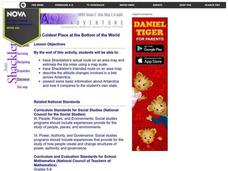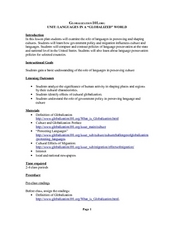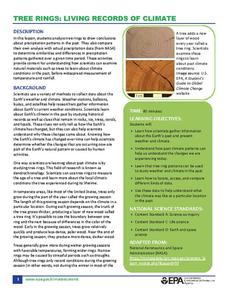Curated OER
Cultures Around the World
Students research, using the Internet, cultures of the world. They identify countries, their currency, holidays, climate and societal information. They look at the distance of international cities from their hometown.
Curated OER
American Focus on World Constitutions
Upper graders read several passages to gain an understanding of the nations that have adopted a constitution similar to the United States Constitution. This is a scripted lesson that is intended to build content-specific vocabulary and...
Curated OER
Delegating Authorities
Students compare and contrast democracies around the world after reading a New York Times article. They create posters and participate in a "democracy roundtable" in which they discuss two democracies.
Curated OER
Animal Tales Around the World
Students explore characteristics of Indian Tales/ Parables. In this literature lesson, students compare contemporary society to western culture through analysis. Students create their own tales using this genre.
Utah Education Network (UEN)
The Pasture and the Fence
Beginning geometers use tiles and grid paper to draw and calculate perimeter and area. Rectangles of different sizes are created and then measured to build understanding. The one-inch grid sheet referenced is attached.
National Endowment for the Humanities
James Madison: Madison Was There
Madison was there! Scholars go on a journey to discover the person behind the founding father label as they explore James Madison's role in the formation of the United States government. The culmination is a writing assignment and...
Curated OER
Compare the United States Government with Other Political Systems
Students explore the U.S. form of government and illustrate other forms of government found throughout the world. They explain the similarities and differences between the U.S and other governments.
Facing History and Ourselves
What is Justice After Genocide?
Students explore the meaning and implications of genocide. In this human rights lesson, students investigate the Aremenian genocide that took place in Turkey and the subsequent trials of the leader of the genocide held by the Turkish...
Curated OER
Lesson 3: U.S. Neutrality and the War in Europe, 1939-1940
Learners examine the U.S. neutrality policies that preceded American involvement in World War II. In this World War II lesson, students explore the events in Europe from 1939 to 1940 and Roosevelt's decision to give military aid to Britain.
Curated OER
Comparing the Confessional traditions that Emerge from the Reformation
Ninth graders examine the Protestant Reformation. In this World History lesson, 9th graders research various places of worship. Students comapre and contrast the different sects of religion that resulted from the Protestant Reformation.
Curated OER
Feudal Japan
An excellent overview of historical Japanese culture, this presentation could carry through a world history unit or a lesson on the history of Japan. Especially interesting are the slides that compare Japanese armor and castles to other...
Core Knowledge Foundation
Thanksgiving with the Pilgrims
Teach kindergartners about the First Thanksgiving with a series of lessons about the Pilgrims' journey to the New World. As they practice handwriting, CVC words, reading comprehension, and fun Thanksgiving songs, they learn about what...
Population Connection
Where Do We Grow from Here?
Did you know that the population is expected to grow to 11 billion by 2100? The resource serves final installment in a six-part series on the global population and its effects. Scholars interpret data from the United Nations about the...
Curated OER
World Statistic Day
Eleventh graders collect data about the state they live in. For this statistics lesson, 11th graders collect and analyze data as they compare themselves to students in other states. They analyze data about a person's education level, and...
Curated OER
The Coldest Place at the Bottom of the World
Students examine Ernest Shackleton's journey through the Antarctic and trace Shackleton's Actual Route on a map using longitude and latitude coordinates. Students compare his intended route with his actual and determine how far off...
Curated OER
Comparing the Health and Lifestyles of 13 Year-olds Around the World.
Eighth graders examine international data and statistics to evaluate the health and trends of 13 year old students around the world.
Curated OER
The Coldest Place at the Bottom of the World
Students research and trace Shackleton's actual and intended route on an area map. They analyze the altitude changes involved in a trek across Antarctica and complete a worksheet comparing Antarctica to their own state.
Curated OER
Languages in a Globalized World
Students explore language changes that may occur in a globalized world. In this language instructional activity, students read the linked articles about globalization and the protection of languages. Students also examine statistics and...
Curated OER
The Whole World is Watching: Iran, 2009
Learners study the impact of social media. In this Iranian election lesson, students examine the outcome of the 2009 election and the public protests that followed it. Learners determine how citizen journalism informed people around the...
Curated OER
World War II History Textbooks Project
Young scholars, in groups, research and compare how events of World War II are treated in various countries' school textbooks through linking with another classroom from that country.
Museum of Tolerance
The Role of Citizens in a Participatory Democracy
Groups research participatory democracies and compare the role and rights of citizens in ancient history with those in recent U.S. history. Guided by a series of questions, individuals compose a persuasive essay in which they discuss the...
University of California
Principles vs. Practices
Have you ever wondered what your own World Order would look like? Scholars use primary and secondary documents as well as video clips to investigate and analyze the Cold War. Using the sources, the principles and practices of nations...
National Endowment for the Humanities
The Rise and Fall of Joseph McCarthy
"I have here in my hand . . ." The war against Communism and Joseph McCarthy’s place in it are the focus of a series of lessons examining postwar America from 1945-1954. Joseph McCarthy takes center stage in this, the final lesson of the...
US Environmental Protection Agency
Tree Rings: Living Records of Climate
Open with a discussion on weather and climate and then explain how tree rings can provide scientists with information about the earth's past climate. Pupils analyze graphics of simulated tree rings from various US locations for the...

























